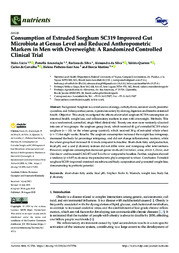Consumption of extruded sorghum SC319 improved gut microbiota at genus level and reduced anthropometric markers in men with overweight: a randomized controlled clinical trial.
Consumption of extruded sorghum SC319 improved gut microbiota at genus level and reduced anthropometric markers in men with overweight: a randomized controlled clinical trial.
Autoria: LÚCIO, H.; ANUNCIAÇÃO, P.; SILVA, B. da; SILVA, A. da; QUEIROZ, V. A. V.; CARVALHO, C. W. P. de; PINHEIRO-SANT'ANA, H.; MARTINO, H.
Resumo: Background: Sorghum is a cereal source of energy, carbohydrates, resistant starch, proanthocyanidins, and 3-deoxyanthocyanins; it promotes satiety by slowing digestion and benefits intestinal health. Objective: This study investigated the effects of extruded sorghum SC319 consumption on intestinal health, weight loss, and inflammatory markers in men with overweight. Methods: This was a randomized, controlled, single-blind clinical trial. Twenty-one men were randomly allocated into one of two groups: the sorghum group (test), which received 40 g of extruded SC319 whole sorghum (n = 10), or the wheat group (control), which received 38 g of extruded whole wheat (n = 11) for eight weeks. Results: The sorghum consumption increased the weight loss intragroup, decreased the body fat percentage intergroup, and did not change inflammatory markers, while the wheat group had increased IL-6 levels compared to baseline. Short-chain fatty acid production, fecal pH, and Alfa and Beta diversity indexes did not differ intra- and intergroup after interventions. However, sorghum consumption decreased genus levels of Clostridium_sensu_stricto 1, Dorea, and Odoribacter and increased CAG-873 and Turicibacter compared to baseline. Further, sorghum showed a tendency (p = 0.07) to decrease the proteobacteria phyla compared to wheat. Conclusion: Extruded sorghum SC319 improved intestinal microbiota and body composition and promoted weight loss, demonstrating its prebiotic potential.
Ano de publicação: 2023
Tipo de publicação: Artigo de periódico
Unidade: Embrapa Milho e Sorgo
Palavras-chave: Beta diversity, Body fat, Cadeia Alimentar, Extrusão, Fatty acids, Fecal pH, Perda de Peso, Peso, Short-chain, Sorghum Bicolor, Sorgo, Weight loss, Ácido Graxo
Observações
1 - Por padrão são exibidas publicações dos últimos 20 anos. Para encontrar publicações mais antigas, configure o filtro ano de publicação, colocando o ano a partir do qual você deseja encontrar publicações. O filtro está na coluna da esquerda na busca acima.
2 - Para ler algumas publicações da Embrapa (apenas as que estão em formato ePub), é necessário ter, no celular ou computador, um desses softwares gratuitos. Sistemas Android: Google Play Livros; IOS: iBooks; Windows e Linux: software Calibre.
Acesse outras publicações
Acesse a Base de Dados da Pesquisa Agropecuária (BDPA) para consultar o acervo completo das bibliotecas da Embrapa.

